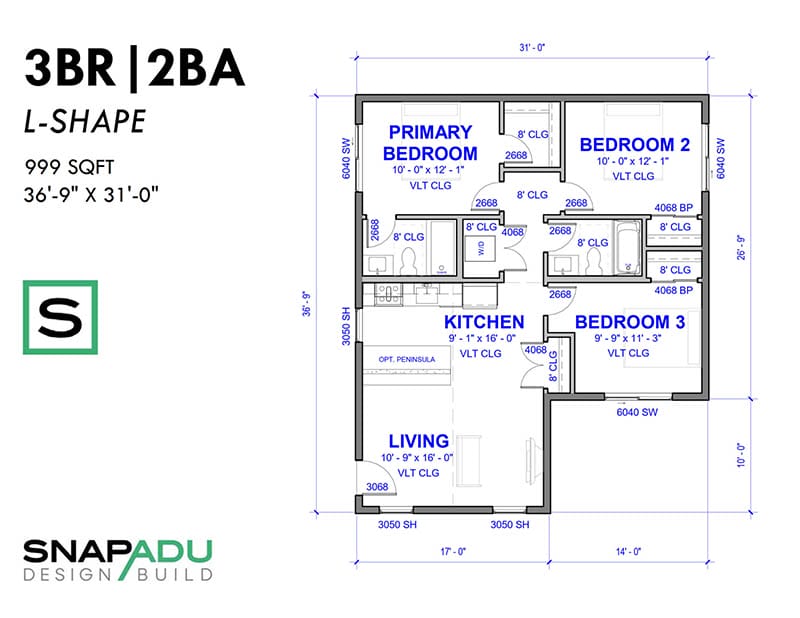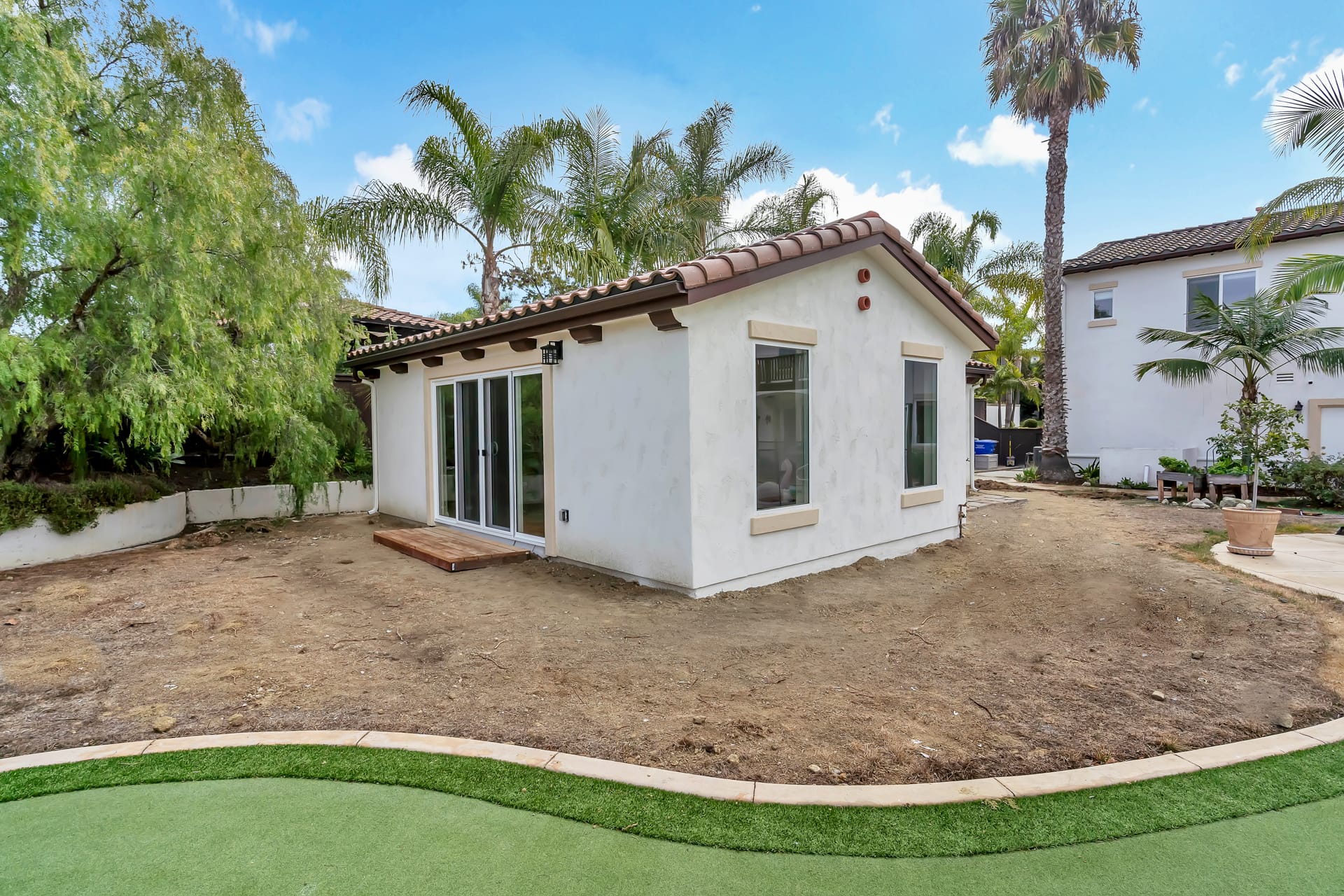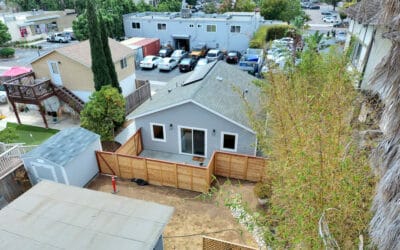When building or owning an Accessory Dwelling Unit (ADU), it’s crucial to understand the various types of insurance that can protect your investment. Each type of insurance covers different aspects of the property and its use, ensuring comprehensive protection for homeowners, tenants, and the structure itself. Here’s a breakdown of the primary insurance types relevant to ADUs, plus guidance on key questions you may be asking about insuring your ADU.
Types of insurance for ADUs
Homeowner’s Insurance
While some homeowner’s policies might already cover secondary structures like sheds, ADUs need distinct additional insurance coverage. Homeowner’s insurance can be extended to include ADUs, protecting against risks such as fire, theft, and certain types of water damage. This extended coverage can help repair or rebuild the ADU in case of covered events. It’s important to inform your insurance provider about the ADU to ensure adequate coverage (keep reading for more info on when do so and what they will need from you).
Homeowners liability protection also provides liability protection, which can cover legal and medical expenses if someone is injured on your property, including the ADU. This is essential for homeowners who rent out their ADUs or have guests frequently.
Landlord Insurance for ADUs
If you plan to rent out your ADU, landlord insurance is highly recommended. This policy covers the unique risks associated with rental properties, such as loss of rental income due to property damage that makes the ADU uninhabitable. Landlord insurance also covers damages caused by tenants, offering a layer of protection not typically included in standard homeowner’s insurance. It ensures that you are financially safeguarded against unforeseen tenant-related issues.
Umbrella Insurance
Umbrella insurance provides additional liability coverage beyond the limits of your homeowner’s or landlord insurance. This can be particularly beneficial for ADU owners who rent out their units or have high-value properties. This type of insurance covers a wide range of liability claims, including those not covered by other policies, offering peace of mind and additional financial protection.
Do I need to inform my homeowners insurance company if I’m adding an ADU to my property?
Yes, it is recommended that homeowners contact their homeowners insurance provider to understand the impact of an ADU project on their insurance. Standard home insurance doesn’t usually cover renovations or new construction. Depending on the size and scope of your project, you should plan on adjusting coverage to make sure the new ADU is covered if it is damaged. Homeowners insurance will not pay for damage to the ADU unless the unit is directly covered by the policy.
When should I let my insurance company know about my ADU?
The best time to finalize insurance for the ADU with your carrier is after you have the closed out building permit card. This card is what demonstrate compliance the ability to legally occupy the ADU. The insurance company should provide an application which will ask for items including type of construction, bedroom and bath count, square footage, roof type and other specifications.
ADU Insurance Companies: Which offer insurance for ADUs?
As of June 2024, we asked clients of SnapADU which companies offered ADU insurance options. Below are those findings.
- Nationwide: offers insurance for the primary residence and the ADU.
- Wawanesa: offers insurance for the primary residence and the ADU.
- AAA: offers separate insurance policies for ADUs, also offers construction / liability insurance.
Note that all of these were the carriers actually selected by the homeowners, not just bids obtained.
Is the ADU insured during the build out?
Indeed, your ADU does have a certain level of coverage during its construction phase. If damage arises due to the builder’s negligence, it’s typically taken care of by the General Liability or Umbrella Policy that a reputable general contractor should have in place. However, for damages stemming from natural events or other property-related issues—think of a tree falling on the ADU—these incidents are not usually considered negligence. Such incidents would be under the purview of other insurance types, possibly homeowner’s or builder’s risk. It’s always a good idea to double-check specifics with your insurance provider.
What is Builder’s Risk Insurance?
During the construction of your ADU, builder’s risk insurance protects against risks such as theft, vandalism, and damage from natural disasters. This insurance is for covering the structure, materials, and equipment on-site during the building phase. This policy is usually project-specific and lasts for the duration of the construction period, ensuring that any incidents that occur while building your ADU are covered.
Does SnapADU carry builder’s risk insurance?
SnapADU doesn’t carry builder’s risk insurance. This is a common practice, as builder’s risk insurance can be quite expensive and may not always be the most cost-effective solution for every project.
Clients do have the option to secure a distinct policy for their project during the construction phase. It’s worth noting that builder’s risk policies can come with a steeper price tag. Plus, any damage costs not covered by either homeowner’s insurance or SnapADU’s General Liability might not even hit the deductible mark, making it potentially less economical to claim.
What insurance does SnapADU carry?
SnapADU maintains comprehensive insurance policies to cover damages resulting from the negligence of our employees or vendors. Our insurance includes Commercial General Liability with $1,000,000 per occurrence and a $2,000,000 general aggregate, Automobile Liability with a $1,000,000 combined single limit, and Workers’ Compensation Insurance with $1,000,000 per occurrence.
Understanding and securing the appropriate types of insurance for your ADU is crucial to protect your investment and ensure peace of mind.Whether you’re building, renting out, or simply owning an ADU, the right insurance coverage can safeguard against a variety of risks and liabilities. Always consult with an insurance professional to tailor your policies to your specific needs and circumstances.
What about taxes?
When adding an accessory dwelling unit to your property, it’s also important to be aware of the potential tax implications. Property taxes may increase due to the added value of the ADU. Understanding how your local tax authority assesses property value and what specific taxes you may owe can help you plan financially. Additionally, if you rent out your ADU, you’ll need to consider rental income taxes. Consulting with a tax professional can provide personalized advice and ensure you remain compliant with all tax regulations. Read more about how ADUs affect taxes.
What about warranty?
An ADU warranty can offer significant peace of mind by covering potential defects and issues that might arise after construction. ADU warranties typically cover structural defects, plumbing, electrical systems, and other critical components. Understanding the terms and duration of the warranty, as well as what is specifically covered, is crucial for making an informed decision. An ADU warranty not only protects your investment but also ensures that any necessary repairs or replacements are handled without incurring substantial out-of-pocket expenses. Read more about ADU warranty coverages.
This blog provides general information to help you get started with understanding ADU insurance, taxes, and warranties, but it should not be considered professional advice. Always consult with licensed professionals in these specific areas. To get a consultation with us about ADU specifics, use our contact form.






0 Comments